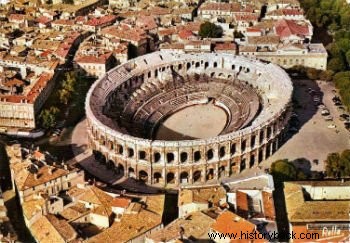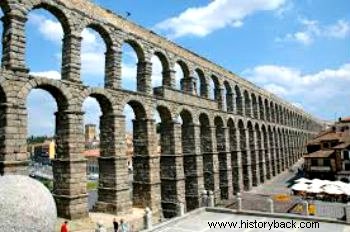The Roman civilization originates with the expansion and consolidation of Rome's power over the Italian Peninsula and neighboring territories.
Origin
Roman civilization is a mixture of influences from Etruscan, Greek and Oriental cultures. If the Greeks stood out for their philosophy and the Egyptians for their architecture, we can say that the Romans stood out for building an Empire that lasted a thousand years.
Thus, they organized a system of communication, transport and laws that could be reproduced in all corners of the Roman Empire. The Romans knew how to appropriate various aspects of the peoples they conquered and Romanize them.
In fact, the art of war, as expressed by the poet Virgil in his Aeneid, seemed to be the aim of the Romans:
Policy
The political organization of Roman civilization changed as territorial conquests took place and the population grew. We distinguish three phases:
- Monarchy:lasted from 753 BC to 509 BC. It is a period shrouded in legend and with little documentation.
- Roman Republic:the first republican experience in history,
- Roman Empire:when civilization reached its maximum splendor.
Economy
The Roman economy was based on agriculture, trade between different provinces, territorial conquests to feed the population and slavery.
The Romans also developed an efficient collection of taxes that had to be delivered to the capital directly. Over time, this led to corruption, as it was common for provincial governors to withhold certain amounts of money from the central government.
Art
Heirs of Greek art, the Romans spread their sculptures, paintings and mosaics throughout the territory they conquered.
Likewise, they built theaters where plays could be performed that served to educate and entertain the population. They also built baths, squares and markets in order to provide more comfort to the inhabitants.
In some cities, arenas were built for gladiatorial games, battle recreations, and fights between men and wild animals.

Roman amphitheater in the city of Nîmes, France.
Learn more about Roman Art.
Architecture
The wealthy Romans prized comfort and, generally, in the patricians' houses there was running water. If the river was not close to the city, an aqueduct was built to bring water to the population who collected it from the fountains installed in the city.
Roman columns also became a hallmark of this culture and were present in forums and temples.

Roman aqueduct in the city of Segovia, Spain.
Discover Roman Architecture.
Religion
The Romans were polytheistic, meaning they believed in many gods. Most of these deities were brought from the Greek pantheon. Thus, Aphrodite became Venus, Ares became Mars, Hera – wife of Zeus – was called Juno by the Romans, and the almighty Greek Zeus, became Jupiter.
In addition, there were still the domestic gods that were worshiped by a family. With the restoration of the Empire, the most important rulers were declared gods by the Senate and their cult could extend throughout the Roman territory.
Read more about Roman Mythology.
Law
Roman law inspired much of Western law as we know it today.
Like politics and economics, Roman law followed the evolution of society. He knew how to incorporate new populations into the Roman Empire, protect private property, define family duties, limit the power of magistrates to act, etc.
One of the Roman innovations in relation to the Greeks and neighboring peoples was the systematization of laws and the emergence of a class of professional jurists. In this way, the Roman magistrates had to know and be able to apply these same laws. The Greeks, for example, never treated law as a science isolated from philosophy.
Roman Civilization Today
Despite having disappeared as a civilization, the fact is that the Western world is a direct heir of Roman civilization.
We can see this influence in more everyday aspects such as arts and architecture. Even in proverbs that are still understandable to us in the 21st century:
Read some examples:
- All roads lead to Rome.
- In Rome do as the Romans do.
- Whoever has a mouth goes to Rome.
- Rome was not built in a day.
Learn more:
- Ancient Rome
- Roman Emperors
- Nero
